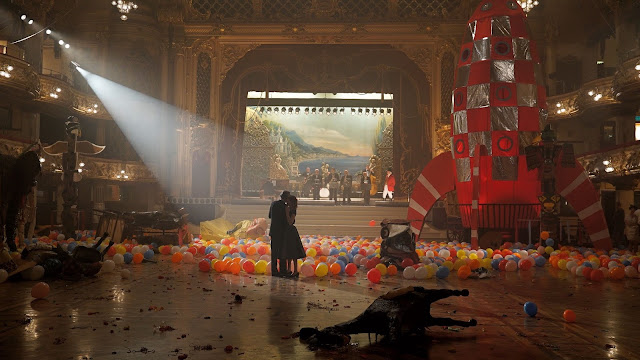"Maybe you have no taste."

Auteur filmmaker Paul Thomas Anderson takes all of his finely-tuned cinematic tools to craft his latest picture into an immersive period romantic drama. Set in glamorous mid-century London in the world of high fashion, the acerbically titled Phantom Thread stars Daniel Day-Lewis—in his reportedly last film role ever—as a revered bachelor couturier, Reynolds Woodcock, who embarks on a troubling obsession of a whirlwind romance.
Luxembourg actress Vicky Krieps co-stars as the formidable, but deceptively expressionless, Alma, a simple waitress turned forceful muse to Reynolds. She quickly becomes the object of his eye in an dizzying and quickly emotionally suffocating affair. Krieps is revelatory in going toe-to-toe with Day-Lewis' gargantuan presence. How Anderson dissects and escalates the toxicity and codependent nature of romantic relationships and strong personalities is savagely amusing and enlightening.
Phantom Thread is both intoxicating and revealing of the troubling nature to the central romance of which the film revolves around. Early on, it's suggested Reynolds treats young women as somewhat disposable and only merely an extension of himself until he meets Alma. How all of this baggage is a reflection of his mother, greater issues with women, and a fear of rejection unfolds naturally and gracefully.
Day-Lewis' powerfully detached intensity as an acclaimed dressmaker and fashion designer cements his difficult bachelor tendencies precisely. The third of the film's triumvirate, Lesley Manville, plays Cyril, Reynolds' unconventional, codependent sister, and throws the most glaring looks of shade. The small cast is superb and affecting in their collective restriction of emotions.

Anderson ever so deftly uses the act and process of dressmaking as clear metaphor for his filmmaking. Fashion acts as a means of personal cinema exploring both the themes of the characters and his films. The depiction and careful craft in hiding secrets in his art is an amusing, self-referential treat.
The House of Woodcock, the fictional fashion powerhouse within the film, is used as a classical expression of post-war drama and mentality contrasted with Alma's blank state of a canvas. Who actually runs the haute couture outlet is up for discussion as the more modern chic movement of luxury and excess start to give way and make Woodcock's aging output less relevant. In parts, Anderson's film is a devastating rumination on marriage and manhood while its fascinating depiction of the act of control and submission is revelatory in its unfolding.
Radiohead guitarist Jonny Greenwood's propulsive musical score complements the film's artisanal nature of formal control deftly. It adds to the gothic romantic tone and effortless flow of the twisted love story. All the elements of the film, its subject matter, design, and execution are stitched together sublimely. The mesmerizing period detail and location shooting make the intimacy of the film, its characters, and moments of reflection even more lavish.
Luxurious but restrained, Anderson and Day-Lewis have designed another completely intimate yet enthralling period character study of an ultra masculine figure this time cleverly set against the most feminine and delicate of backgrounds. It is meticulously hypnotic and a fully immersive experience based on its superbly fine craftsmanship. The film is also dryly hilarious and sharp riff on classical romance stories. It's beautifully made.
More | YVArcade / AV Club / Indiewire / ScreenCrush / The Playlist / Vox







0 reactions:
Post a Comment